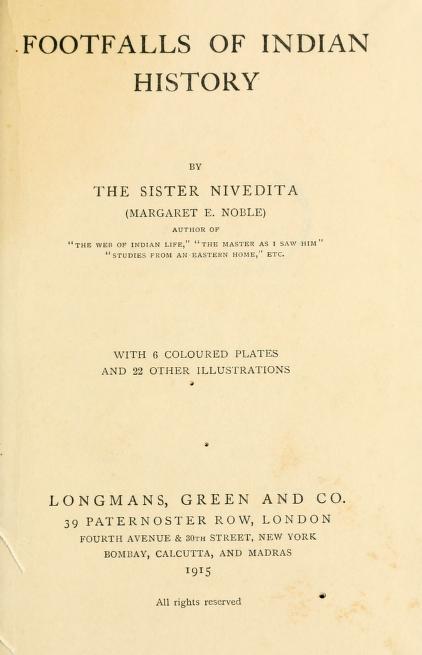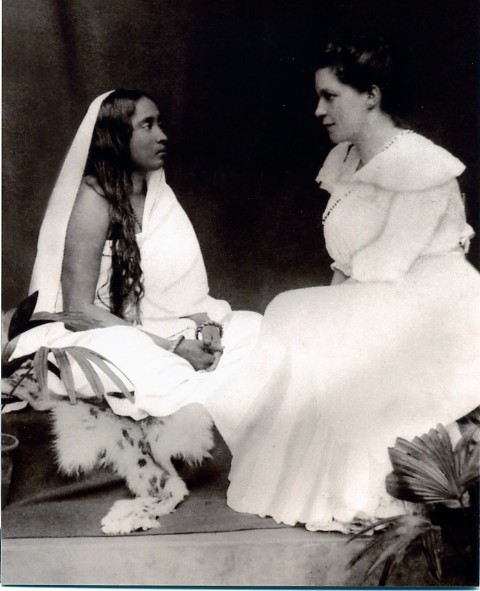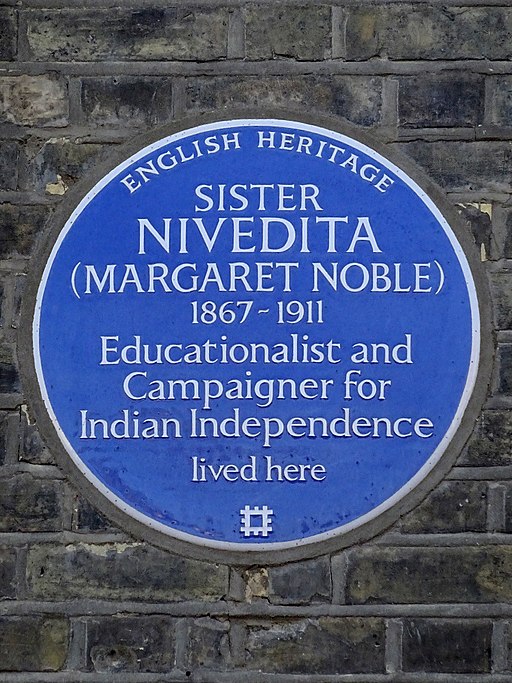It is singularly appropriate that in 2017, the seventieth year after Indian Independence, English Heritage put up a blue plaque on the house in Wimbledon where Margaret Noble (1867-1911) once lived. 2017 was coincidentally also the 150th anniversary of her birth. Margaret Noble is little remembered in the UK today, but the caption on the plaque, ‘Educationalist and Campaigner for Indian Independence’, hints as to why she is still remembered in India, more commonly as Sister Nivedita (the Dedicated), the name given to her by her guru Swami Vivekananda (1863-1902).
Such was Nivedita’s contribution to Indian national life that an Indian postage stamp was issued to mark the centenary of her birth, and the 150th anniversary of her birth last year was celebrated in India by various public events.
Born in Ireland, Nivedita was educated in Halifax, Yorkshire, and then taught in various schools in England and North Wales, before moving to London where she established her own progressive school. It was in London that she met Vivekananda. Although it might not raise many eye-brows today, it was anything but commonplace in the late nineteenth-century for a British woman to become the initiated disciple of a Hindu guru, especially when this involved abandoning her former life in London to begin anew in Calcutta. Nivedita opened a school for girls in Calcutta and participated in relief work organised by the Ramakrishna Math and Mission, the organisation created by Vivekananda in the name of his guru. A tireless networker, Nivedita played a major part in contemporary debates about Indian ‘national art’, collected Hindu and Buddhist stories, and was the first to propose a design for an Indian national flag. After Vivekananda’s death, she became increasingly active in the growing campaign for independence from British rule—including with groups who embraced violent means to secure their political goal. She was, not unsurprisingly, a controversial figure. Her public defence of aspects of popular Hindu practice drew censure from both Indian reformers in India and in her former circle in London. She repeatedly asserted her Christian identity while embracing aspects of Hindu practice and belief, and continued to affirm her loyalty to the British Empire until quite late in life, even as she became increasingly involved in the independence movement. Such evidence of the complexities and contradictions of her transnational life merit closer exploration, but have been largely by-passed by biographers with close links to the Ramakrishna Math and Mission. Their accounts, perhaps understandably, focus on her guru’s transformative effect on her life.
 Nivedita was not the only British woman of her time who was drawn to the service of India, and particularly of Indian women, at a time when India offered some British women more scope for a public role than they would have then had at home. What is striking about Nivedita is that, although she clearly worked for change in some areas, she did not seek to ‘reform’ India according to Christian or other convictions shaped in Europe. Consistent with her controversial defence of Hindu devotional practice, she identified herself with India, something that her guru deliberately fostered.
Nivedita was not the only British woman of her time who was drawn to the service of India, and particularly of Indian women, at a time when India offered some British women more scope for a public role than they would have then had at home. What is striking about Nivedita is that, although she clearly worked for change in some areas, she did not seek to ‘reform’ India according to Christian or other convictions shaped in Europe. Consistent with her controversial defence of Hindu devotional practice, she identified herself with India, something that her guru deliberately fostered.
Nivedita was an Irishwoman by birth whose life was shaped by her education and career as a teacher in England, yet she gave the latter half of her life to the service of India rather than to the cause of Irish freedom, giving up the school she had established in London and the social standing that brought her. Raised Protestant, she toyed at one time with converting to Roman Catholicism, studied Buddhism, and after a period of religious agnosticism famously became the disciple of a Hindu guru. With her remarkable career in India being recently commemorated, Nivedita’s life reminds us that the blurring of notions of religious and national identity, which we tend to associate with accelerating globalising processes of recent decades, have rather deeper roots and antecedents.
You can read more about Nivedita’s remarkable life in ‘The Making of the Ideal Transnational Disciple: Unravelling Biographies of Margaret Noble/Sister Nivedita’ in Philippe Bornet (ed.), Translocal Lives and Religion: Connections between Asia and Europe in the Late Modern World (Equinox, forthcoming 2019).


